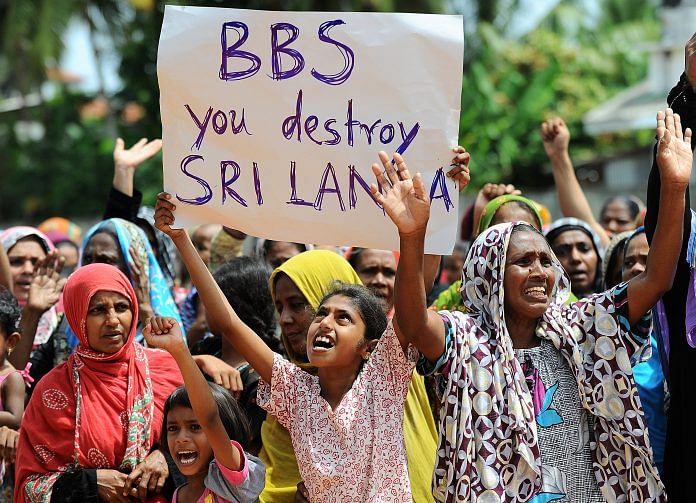Reduced authoritarianism and a significant widening of the space for dissent constitute the Sri Lankan government’s greatest accomplishments.
In the wake of coordinated anti-Muslim violence, the Sri Lankan government announced a state of Emergency last month. Colombo also placed restrictions on social media. The regulations and restrictions have been lifted, but the violence and the government’s subsequent overreaction are both troubling developments.
Sadly, the Sinhala-dominated state remains unable or unwilling to protect the rights of the country’s ethnic minorities. There were even credible reports of state complicity.
What’s more, the results of the country’s 10 February local government elections – in which the Sri Lanka People’s Front (SLPP), a recently created political party backed by former president Mahinda Rajapaksa won resoundingly – are also cause for concern.
The latest round of anti-Muslim destruction and the SLPP’s strong showing in February reiterate that Sinhala-Buddhist nationalism is a political force par excellence in Sri Lanka. These recent events and growing tensions within the ruling alliance are all prominent reminders that Sri Lanka’s widely acclaimed ‘democratic transition’ three years ago has fallen far short of expectations.
In January 2015, Rajapaksa unexpectedly lost a presidential election that would have granted him an unprecedented third term; Sri Lankan voters elected Maithripala Sirisena instead. A closely contested parliamentary election in August 2015 reinforced the mandate for improved governance, reduced corruption and constitutional reform.
September 2017 marked two years of the coalition government — built upon an awkward alliance between the Sri Lanka Freedom Party (SLFP) and the United National Party (UNP), the country’s two main political parties that are historical rivals. The political situation has become increasingly precarious.
Since Sirisena became president, how much have things really changed?
Reduced authoritarianism and a significant widening of the space for dissent constitute the government’s greatest accomplishments. Yet, many other expected improvements have not materialised. Sirisena’s tenure has been plagued by ineptitude, tricky coalition politics and an inability or unwillingness to deviate from many of the problems that characterised Rajapaksa’s time in office.
Sirisena has spent much of his time in office trying to appease Rajapaksa’s supporters and unite the SLFP; those efforts have been ineffectual, and further undermined anti-corruption efforts.
Transitional justice, another key aspect of the government’s purported reform agenda, is going nowhere quickly.
In 2015, the Sirisena administration announced four mechanisms — to properly deal with the past and heal the wounds of civil war — would be created: The Office of Missing Persons; a judicial mechanism to handle alleged wartime abuses; offices to address disappearances and reparations; and a truth commission. Most of this hasn’t happened. The Office of Missing Persons is now operational, though it’s unclear when the office will be fully functional.
And still, nearly a decade after the war ended, the Tamil-dominated northern and eastern provinces — where most of the fighting occurred — remain heavily militarised places where civilians have been unable to regain a sense of normalcy.
Sirisena’s anti-corruption message resonated strongly with the electorate in 2015. However, there has been virtually no accountability for high-level corruption that took place during Rajapaksa’s reign. And the coalition government hasn’t adequately addressed allegations of corruption within its own ranks. There had been high hopes for the passage of a new, more inclusive, constitution, although it’s hard to have confidence in that process either.
Presidential and parliamentary elections are both expected in 2020 and some provincial council elections are supposed to be held this year. It will be difficult to implement important reforms before then.
Nevertheless, moving expeditiously to address corruption concerns, coupled with improved governance more broadly, isn’t just the right thing to do; progress in these crucial areas could also thwart a more profound Rajapaksa resurgence.
Impunity — a longstanding problem — begets more criminality and more impunity. Trying and ultimately convicting the guilty perpetrators associated with the latest spate of anti-Muslim attacks is essential.
International actors welcomed Sirisena’s ascendance with great exuberance, cheering a return to democracy in the country (and a concomitant thawing of diplomatic ties that had grown severely strained under Rajapaksa’s reign). Most have only just begun to publicly acknowledge the government’s disappointing performance after its promising start.
Going forward, statements that reflect concerns about backsliding are more than warranted. Additionally, any increased bilateral military cooperation should be made conditional on demonstrable progress pertaining to security sector reform.
Healing the wounds of the nation’s brutal war and, at the same time, deepening democracy on the island are processes that must be managed by Sri Lankans. Yet, other nations can and should support those efforts. That could start with speaking more frankly about the current stalemate and the difficult decisions that lie ahead.
Taylor Dibbert is affiliated with the Pacific Forum at the Center for Strategic and International Studies, US. The views expressed are his own. His Twitter handle is @taylordibbert



